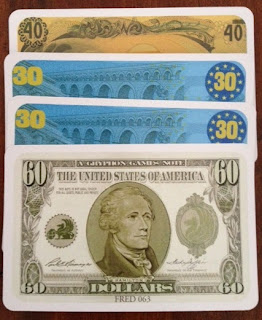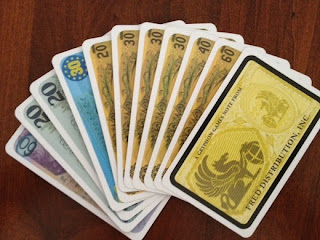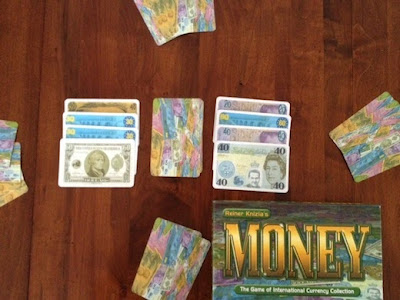So, the game that causes the most awkward conversations has to be Reiner Knizia's Money. (Conversations like, "Hey, can I borrow Money?" or "I'd really like you to include Money in the trade.")
Anyway; other than being an awkward conversation starter, Money is also an interesting little auction game. To start the game, each player starts with a handful of cards that represent money in both different currencies and denominations. Every turn there are two piles of money, each with four different "bills" (cards). Players now take cards from their hand and perform a silent auction. Revealing at the same time, players get to select a pile of money and exchange their bid for if (starting with whoever bid the most). Interestingly, instead of only purchasing the piles of money in the middle of the table, you can also buy other player's bids (still by exchanging your bid with theirs). At this point, you might be wondering what the point is in this futile exercise. Well, the reason that this isn't an exercise in futility is the scoring. At the end of the game (when the deck runs out), each player scores points based on what they have collected (not necessarily how much). Each set of all three 20's or 30's of the same currency are worth 100 points. Additionally, each currency type in which a player has between 100 and 200 "dollars" is worth the total value minus 100. Next, any currency in which a player has at least 200 "dollars" is worth its full face value. Finally, there are Chinese 10's - these are always worth 10 points. Whoever has the most points wins the game!
 |
| A typical pile of cash! |
The next pro that I have for Money is that "it takes money to make money." Which means that in any given round you have to bid something. Which also means that you are probably not going to (immediately) recover whatever you are bidding. That's often not a problem; but, if you have done a really good job of collecting only cards that are relevant to the currencies that you're collecting, then it might be a huge problem. If might force you to go ahead and abandon one of the currencies that you were just starting to collect - at least for a time. (Which, in turn, might make another player very happy, if they had been wondering where the rest of that currency was!)
My final pro for Money is that I really like that you don't simply win by making the most money. If that were the case, then I think that the game would be fun to play once or twice, but would have its novelty disappear quickly. Instead, you really must specialize (and adapt your bids to what you are specializing in). Early in the game, it might be beneficial to simply collect whatever pile has the highest face value. However, at the end of the game, a single bill might be worth 230 points! (This could happen if you have $190 in a currency, and you have two of the three 30's in that currency. The final 30 would be worth 100 points for completing your set of 30's, an additional 100 points for putting you above $200 in that currency, and also worth its face value!) So, the biggest bills in the game aren't necessarily the "best" ones.
 |
| A typical hand in Money - including a "bluff" card |
The second con that I have for Money is that the tie-breaker in the silent auctions can be frustrating. When two players bid the exact same amount of money, the tie breaker goes to the player that bid using the lowest serial number on a "bill". This generally corresponds to whoever bid using the lower bills (20's have lower serial numbers than 60's), but can wind up just arbitrarily picking someone. Whereas I realize that there has to be something to break these ties, it can be very frustrating if you lose out on a choice pile of cash simply because your bill's serial number wasn't low enough.
Overall, I give Money a 9.0/10. Honestly, I only tried the game because they were briefly giving away the iPhone version. However, I'm quite glad that I did! I think that Money is a fabulous little auction game that fits nicely into most any collection.
If Money sounds like a game that you would enjoy, you should definitely check out For Sale and Modern Art - as well as Ra.



0 komentar:
Posting Komentar